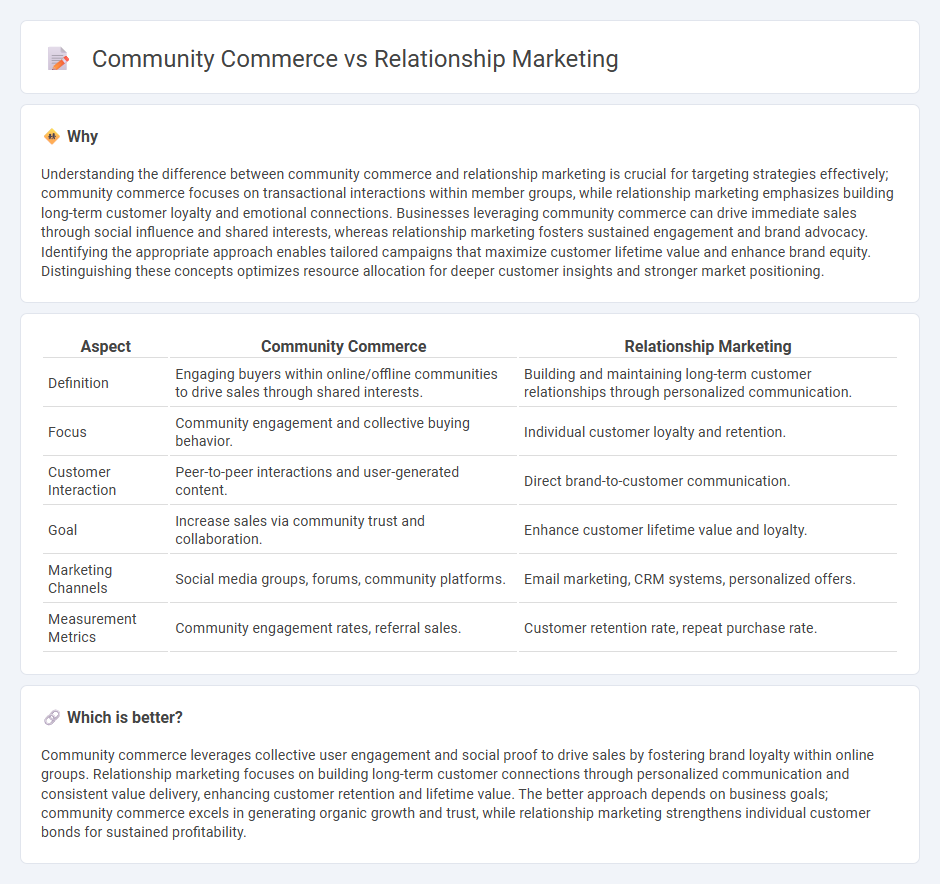
Community commerce leverages collective brand loyalty by engaging groups of consumers who share interests, creating organic promotion and trust through social interactions. Relationship marketing focuses on building long-term individual customer connections through personalized communication and tailored offers to increase retention and lifetime value. Explore deeper insights to understand how these strategies can drive your marketing success.
Why it is important
Understanding the difference between community commerce and relationship marketing is crucial for targeting strategies effectively; community commerce focuses on transactional interactions within member groups, while relationship marketing emphasizes building long-term customer loyalty and emotional connections. Businesses leveraging community commerce can drive immediate sales through social influence and shared interests, whereas relationship marketing fosters sustained engagement and brand advocacy. Identifying the appropriate approach enables tailored campaigns that maximize customer lifetime value and enhance brand equity. Distinguishing these concepts optimizes resource allocation for deeper customer insights and stronger market positioning.
Comparison Table
| Aspect | Community Commerce | Relationship Marketing |
|---|---|---|
| Definition | Engaging buyers within online/offline communities to drive sales through shared interests. | Building and maintaining long-term customer relationships through personalized communication. |
| Focus | Community engagement and collective buying behavior. | Individual customer loyalty and retention. |
| Customer Interaction | Peer-to-peer interactions and user-generated content. | Direct brand-to-customer communication. |
| Goal | Increase sales via community trust and collaboration. | Enhance customer lifetime value and loyalty. |
| Marketing Channels | Social media groups, forums, community platforms. | Email marketing, CRM systems, personalized offers. |
| Measurement Metrics | Community engagement rates, referral sales. | Customer retention rate, repeat purchase rate. |
Which is better?
Community commerce leverages collective user engagement and social proof to drive sales by fostering brand loyalty within online groups. Relationship marketing focuses on building long-term customer connections through personalized communication and consistent value delivery, enhancing customer retention and lifetime value. The better approach depends on business goals; community commerce excels in generating organic growth and trust, while relationship marketing strengthens individual customer bonds for sustained profitability.
Connection
Community commerce thrives on fostering genuine relationships between brands and customers, enhancing trust and loyalty through personalized interactions. Relationship marketing focuses on long-term engagement and customer satisfaction, which directly supports community commerce by building a network of brand advocates. Both strategies leverage social connections and shared interests to drive sustainable business growth and increase customer lifetime value.
Key Terms
**Relationship Marketing:**
Relationship marketing emphasizes building long-term connections with customers through personalized communication, trust development, and customer loyalty programs to enhance lifetime value. It leverages data analytics and CRM systems to tailor experiences and anticipate customer needs, fostering sustained engagement and brand advocacy. Explore deeper strategies to maximize customer retention and satisfaction in relationship marketing.
Customer Retention
Relationship marketing emphasizes personalized communication and loyalty programs to enhance customer retention by building long-term engagement and trust. Community commerce leverages social networks and user-generated content to create a sense of belonging, fostering repeat purchases through shared experiences and peer influence. Explore effective strategies for boosting customer retention in both relationship marketing and community commerce.
Personalization
Relationship marketing emphasizes personalized communication and tailored offers to build long-term customer loyalty through one-to-one interactions. Community commerce leverages collective engagement and shared interests within a group, fostering personalization through community-driven content and peer recommendations. Explore deeper insights into how personalization shapes customer experiences across these strategies.
Source and External Links
What Is Relationship Marketing? | Definition from TechTarget - Relationship marketing focuses on building customer loyalty and long-term engagement by creating strong emotional connections rather than prioritizing one-time sales, helping businesses retain customers and identify unmet needs for deeper relationship growth.
Relationship Marketing: 5 Ways to Create Lifelong Customers - Relationship marketing builds close customer relationships through emotional bonds, purpose-driven connections, brand communities, feedback integration, and exclusive offers, which increase customer loyalty and spending.
What is relationship marketing? Definition, Examples, Levels - Relationship marketing is a long-term strategy with stages from initial contact to committed partnership, focusing on trust and seamless experience, illustrated by examples like PrescribeWellness improving customer loyalty through targeted solutions.
 dowidth.com
dowidth.com